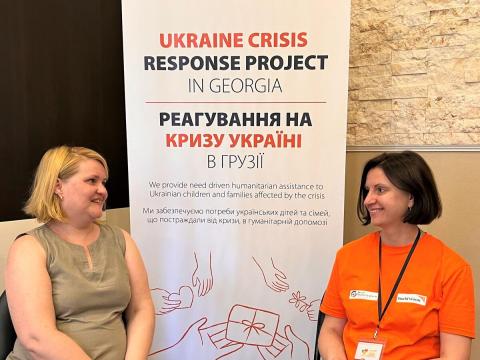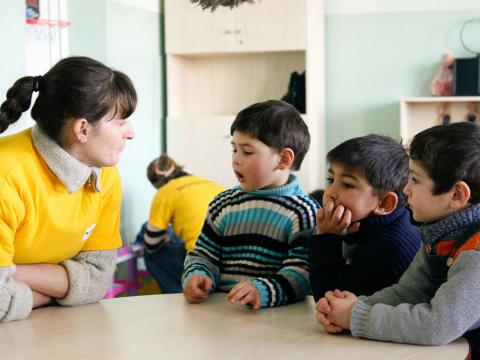Georgia
Recent Updates
World Vision Georgia
World Vision is a strong advocate for children's rights in Georgia. They help improve the lives of disadvantaged groups by supporting the country's economic and social needs. They have been working towards creating a healthy and inclusive environment for everyone since they started in the region.
World Vision supports children, families, vulnerable groups, and refugees. They commit to meeting the diverse needs of the population.
Georgia has faced many social, economic, and humanitarian challenges since gaining independence in 1991. These ongoing challenges have necessitated sustained efforts and comprehensive initiatives across various fields.
Despite progress and reforms in different sectors, Georgia still faces challenges with extreme poverty. This issue affects 11.8% of the population in 2024. This has resulted in a marked decline in living standards and overall well-being of families.
In 2024, the government needs to help 670,000 people. Out of all the children, 254,333 (27%) depend on the government for their basic needs.
This underscores the socio-economic challenges a considerable number of people face.
Tragically, up to 3000 children in Georgia face a daily struggle for survival on the streets of major cities. Street children beg and sell small things. They have no chances to grow and are seen as "street children." They are used and taken advantage of from a young age.
A significant challenge also arises with newly established Child Protection Units in the municipalities – they lack supervision mechanisms and expertise. In addition to the problem, certain places do not have these child units. These places identify the families with children who require the most assistance in their specific area.
Another alarming statistic is that more than 31% of youth are not in employment, education, or training (NEET). Addressing this issue is paramount for fostering a more inclusive and prosperous society.
Georgia has approximately 299,000 internally displaced people and over 30,000 international migrants, refugees, stateless individuals, and asylum seekers within its borders. This difficult situation shows the urgent need for strong help and support to meet the different needs of the displaced people.
World Vision Georgia is taking action to address challenges by implementing programs and activities that meet the needs of different groups.
Our goal is to ensure the safety and health of children. We achieve this by supporting the Child Rights Code, which protects their rights.
Our Impact
265,000
12,089
3,374
9,500
1,500
4,560
We work towards ending institutionalization, as it is not beneficial for children. Instead, we focus on creating alternative care services that meet global standards. We have created rules and monitoring methods for Child Protection Units to strengthen the Child Welfare and Protection System. Additionally, we offer training to staff to help them work better.
World Vision Georgia has been actively working on the issue of children living and working on the streets for several years. Our 3 Day Care Centres and 24/7 Shelters help vulnerable children with medical, food, and emotional support every day. Our mobile teams also reach out to these children on the streets, offering help and guiding them to different services.
We work to improve social services for vulnerable groups by filling gaps and enhancing service quality. Through our programs, we reached 106,000 vulnerable children in the country.
To contribute to poverty alleviation and uplift vulnerable families, we provide livelihood support and empower families economically. We are committed to not only meeting immediate needs but also contributing to broader systemic changes. This includes active engagement in policy advocacy, implementing poverty alleviation strategies, fostering capacity building for civil servants and training social workers. With our efforts and multilayered approach, we enhanced the socioeconomic resilience of vulnerable families living in extreme poverty.
In tackling the problem of unemployment and poverty nationwide, World Vision Georgia places a strong emphasis on empowering and engaging the youth in social life, by equipping them with essential knowledge, life, and technical skills for their career development.
World Vision Georgia also actively supports refugees to help them adapt to new environments and realize their rights. By providing diverse services we have covered 12,089 refugees in the country. We work hard to overcome challenges and help children and society.
At World Vision Georgia, we promote environmental sustainability through eco-friendly practices in our operations, programs, and advocacy. Our Green Team leads initiatives like waste management, tree planting, and climate awareness. We also support sustainable agriculture, clean energy in construction, and green vocational education for youth.
We strive to create a safe, inclusive, and equitable society for all. Guided by the core principles of Gender Equality and Social Inclusion (GESI), we uphold high standards across all our initiatives. Our programmes actively empower women and girls, and we integrate gender-sensitive practices into every aspect of our work.
Happy Space - a Non-Formal Education and Development Centre for Ukrainian refugees
Happy Space is a Non-Formal Education and Development Centre, where we see lives changing every day. Ukrainian refugees of all ages—from children to the elderly—walk through our doors seeking not just education or support, but a place where they can feel understood, valued, and safe. Since the start of the war in Ukraine, we’ve stood alongside thousands of families, helping them adapt to new environments, overcome language and cultural barriers, and rediscover hope. The place has become more than just a centre — it’s a second home for many displaced individuals and families. It’s a space where children laugh again, parents find relief, and everyone can dream of a brighter future. To date, over 6,000 individuals have benefited from Happy Space's diverse services and psychosocial support. The centre operates in Tbilisi and Batumi within Ukraine Crisis Response Programme, funded by World Vision International and Aktion Deutschland Hilft (ADH).

Our vision
Rooted in the belief that every child should have the opportunity to reach their full potential. To achieve this, World Vision Georgia places children at the heart of its development efforts, prioritizing their well-being and growth. This child-centric approach is the cornerstone of our work.



